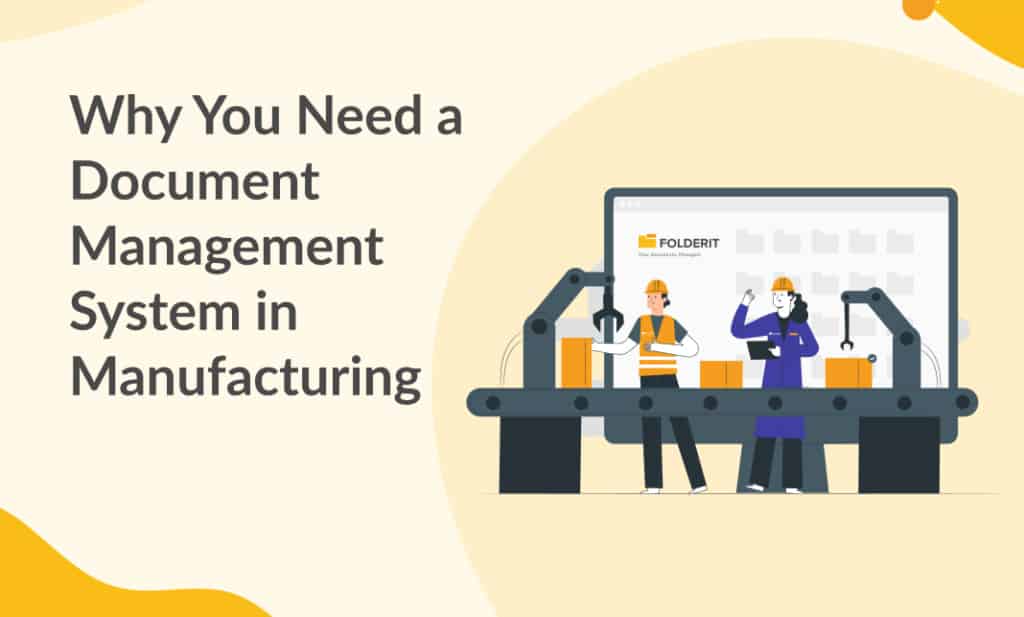The manufacturing industry, a cornerstone of the global economy, is a complex ecosystem that involves a myriad of processes, from product design and production to quality control and distribution. Amidst this complexity, one element that binds these processes together is documentation. From design blueprints and production schedules to quality reports and regulatory compliance documents, the manufacturing industry is inundated with paperwork. Managing these documents efficiently is crucial for smooth operations, regulatory compliance, and overall productivity. This is where a Document Management System (DMS) comes into play.
The Manufacturing Industry and Its Documentation Challenges
The manufacturing industry is diverse, encompassing sectors like automotive, electronics, pharmaceuticals, and more. Each sector has its unique set of documentation requirements. For instance, the automotive sector deals with design specifications, assembly instructions, and safety protocols, while the pharmaceutical sector must manage formulae, test results, and regulatory compliance documents.
Managing these documents can be a daunting task. Traditional methods of document management, such as physical storage or local servers, are no longer viable due to the sheer volume of documents and the need for quick retrieval. Moreover, these methods do not provide the flexibility and scalability required in today’s dynamic manufacturing environment.
The Role of a Document Management System in Manufacturing
A DMS, like Folderit, is designed to address these challenges. It provides a centralized, digital repository for all documents, making them easily accessible to all stakeholders. This not only saves time spent on searching for documents but also ensures everyone is working with the most up-to-date information.
Moreover, a DMS can automate many of the repetitive tasks involved in document management. For instance, it can automatically route documents for approval, send reminders for pending tasks, and even generate standard documents using pre-defined templates. This not only saves time but also reduces the chances of human error.
Integration with Existing Manufacturing Software Systems
Most DMS can be integrated with existing manufacturing software systems. This seamless integration ensures that all documents are linked to the relevant processes, providing a complete view of the manufacturing workflow. For instance, a design document can be linked to the corresponding production schedule, quality report, and compliance document, providing a comprehensive view of the product lifecycle.
Security and Compliance in Document Management
In the manufacturing industry, document security and regulatory compliance are of utmost importance. A DMS provides robust security features, including access control, encryption, and audit trails, to protect sensitive documents from unauthorized access and data breaches. Moreover, it can help ensure compliance with industry-specific regulations by providing tools for data privacy and retention.
The Future of Document Management in Manufacturing
Emerging technologies like artificial intelligence, machine learning, and the Internet of Things (IoT) are set to revolutionize document management in manufacturing. These technologies can automate document classification, enhance search functionality, and provide predictive analytics, further improving the efficiency and effectiveness of document management.
Benefits of a DMS in Manufacturing
Following the introduction and exploration of the role of a DMS in manufacturing, let’s delve into the specific benefits it offers. A DMS brings several advantages to the table, including:
- Efficiency: A DMS eliminates the need for manual document handling, thereby reducing the time spent on searching, retrieving, and organizing documents. This allows employees to focus on their core tasks, leading to increased productivity.
- Accuracy: With automated workflows and templates, a DMS reduces the risk of human error in document creation and management. This ensures the accuracy of documents, which is crucial in manufacturing where a single error can have significant consequences.
- Compliance: Compliance with industry regulations and standards is a major concern in manufacturing. A DMS helps maintain compliance by ensuring that all documents are up-to-date and readily available for audits and inspections.
- Collaboration: A DMS facilitates collaboration by allowing multiple users to access and work on documents simultaneously. This is particularly beneficial in manufacturing where teams often need to collaborate on documents such as design blueprints and production schedules.
Real-World Examples of DMS in Manufacturing
Moving on from the benefits, let’s look at some real-world examples of DMS implementation in the manufacturing sector. These examples illustrate how a DMS can transform document management in manufacturing:
Automotive Manufacturer:
An automotive manufacturer was struggling with managing the vast amount of documents involved in the design and production process. After implementing a DMS, they were able to centralize all their documents, making them easily accessible to all team members. This not only improved efficiency but also facilitated collaboration among teams.
Pharmaceutical Company:
A pharmaceutical company needed to ensure compliance with stringent industry regulations. By adopting a DMS, they were able to maintain up-to-date records of all compliance-related documents, making audits and inspections a breeze.
Electronics Manufacturer:
An electronics manufacturer was facing challenges in managing contracts with suppliers and customers. With a DMS, they were able to store all contracts in a central repository and automate the contract management process, leading to improved efficiency and reduced risk of contract breaches.
Choosing the Right DMS for Your Manufacturing Business
After understanding the benefits and seeing real-world examples, the next step is choosing the right DMS for your manufacturing business. Here are some factors to consider:
- Scalability: Choose a DMS that can grow with your business. As your manufacturing operations expand, your document management needs will also increase. A scalable DMS will be able to accommodate this growth.
- Integration Capabilities: Your DMS should be able to integrate with your existing manufacturing software systems. This will ensure a seamless flow of information and enhance the efficiency of your operations.
- Security Features: Given the sensitive nature of manufacturing documents, your DMS should have robust security features to protect your documents from unauthorized access and data breaches.
- User-Friendliness: A DMS with a user-friendly interface will be easier for your team to adopt and use, leading to higher productivity.
- Cost: Finally, consider the cost of the DMS. While a DMS can bring significant cost savings in the long run, it’s important to choose a solution that fits within your budget.
The Imperative of a DMS in Manufacturing
A Document Management System is not just a nice-to-have but a must-have in the manufacturing industry. By providing a centralized, secure, and scalable solution for document management, a DMS like Folderit can significantly enhance the efficiency and productivity of manufacturing operations. So, if you’re in the manufacturing industry and haven’t yet implemented a DMS, now is the time to do so.



